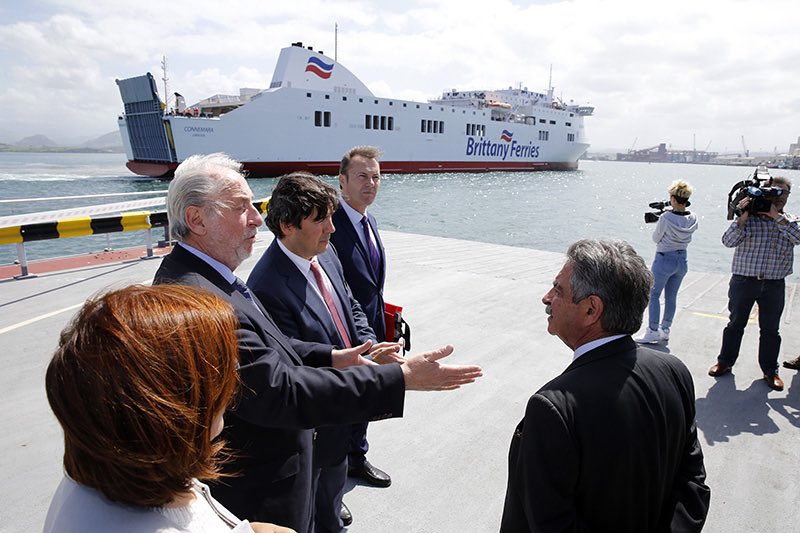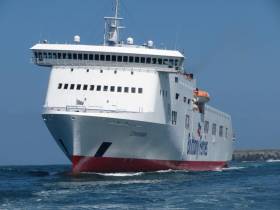Displaying items by tag: Maiden Crossing Completed
#FerryNews - Connemara, Brittany Ferries chartered ropax completed a maiden Cork-Santander crossing this afternoon, marking the historic first arrival of an Ireland-Spain ferry service, writes Jehan Ashmore.
Under glorious blue skies, Connemara arrived into Santander Bay and docked at the Muelle del Almte with the backdrop of the Cantabrian mountains of northern Spain. The 500 passenger / 120-cabin capacity ropax can take between 80-100 cars and 100 freight trailers. The direct route is a game-changer for tourists and hauliers and notably in a looming post-Brexit environment in addition to enhancing cultural ties between Ireland and Spain.
Brittany Ferries operates Connemara on the 26-hour crossing and based on a twice weekly overnight sailings, departing Cork on Wednesdays (see yesterday's coverage) and Fridays. The return sailings from Santander are on Sundays and Thursdays. The new service has been a strategic goal for the Port of Cork Company when plans were made to establish the link since 2004 that involved discussions with other ferry operators and another port in northern Spain.

Above: Connemara arrives in Santander this afternoon with officials from Gobierno de Cantabria, the regional authority of the autonomous community. The officials stand on the ferry's ro-ro berth linkspan located on the quay of the ferry terminal (Photo: Government of Cantabria - twitter)
Among the sold-out inaugural économie 'no-frills' which only caters for motorists passengers were fans of Leinster Rugby. They are heading for the European Rugby Champions Cup final in Bilbao to be held on Saturday where they play French team Racing 92 from Paris.
Also driving off the 195 vehicle ferry onto Spanish soil were an impressive array of supercars worth millions of euro. They involved Bentleys, BMW's, McCLarens and Lamborghinis. The cavalcade of high-performance cars are to embark on a 3,000km, 10-day fundraising tour throughout Spain in aid of childrens’ charity the Bubblegum Club.
Brittany Ferries are no strangers to the Cantabrian port having established four decades ago a direct service from the port to the UK. This began with a Plymouth-Santander service in 1978.
In the same year the French ferry company launched the Cork-Roscoff route in which Connemara also carries out a single weekday round-trip service again based on the no-frills concept. The Ireland-France route taking 14 hours is also operated by flagship Pont-Aven which has sailings based on cruiseferry standards.





























































